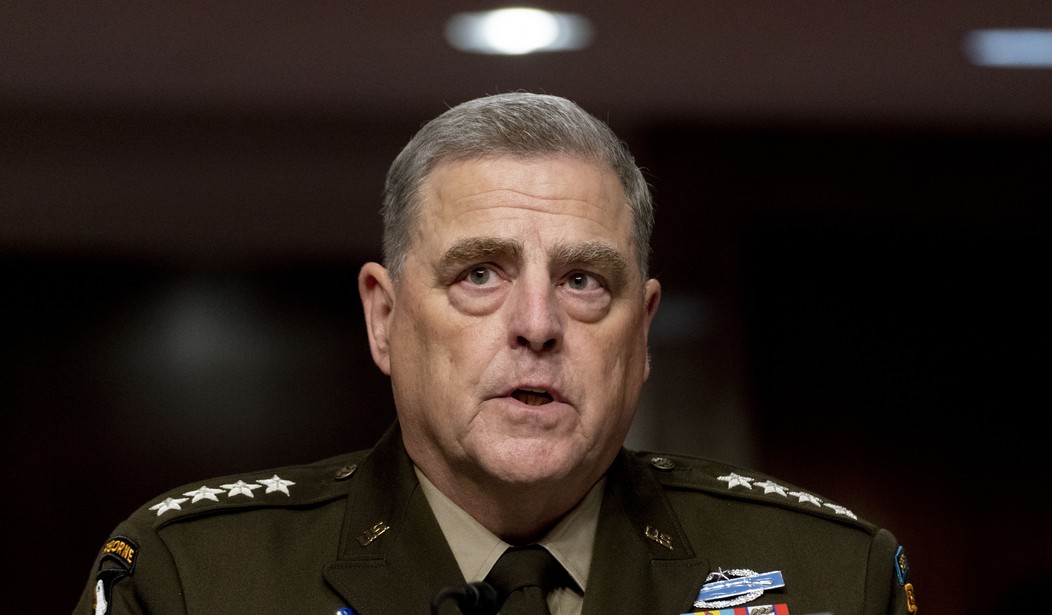Chairman of the Joint Chiefs of Staff, Army Gen. Mark Milley, is appearing in front of Congress as I write and he opened his defense of the Biden administration’s movements with regard to Afghanistan by tacking on a statement related to what he noted were questions “in the media” about his phone calls with his Chinese counterpart while Trump was still in office.
In an interesting twist, he says his role was to de-escalate tensions that had arisen from “intelligence” that may have spooked the Chinese.
"I know, I am certain, that President Trump did not intend to attack the Chinese." Cites "concerning" intelligence that Chinese thought so anyway. "My task at that time was to deescalate. My message then was consistent: Stay calm, stay ready, and deescalate."
— Paul D. Shinkman (@PDShinkman) September 28, 2021
This comes after Milley was criticized for what many saw as his attempt to go around the chain of command and speak to the Chinese about the supposed mental health of the President, a revelation made in a book by Bob Woodward and Robert Costa.
Milley will also be challenged over damning reports in a new book that he went behind then-President Trump’s back to deal with China — assuring Beijing officials he would warn them of any planned military actions his commander-in-chief planned.
He’d previously declined to comment on details in the book, “Peril” by Bob Woodward and Robert Costa, saying he was saving his answers for the congressional hearings starting Tuesday.
Peggy Noonan in an op-ed at the Wall Street Journal, seems to agree with the General when she notes that perhaps he was right to try to de-escalate if tensions were high. But Milley, as she notes, wasn’t working so much for Trump as he was working for Milley.
But I see it this way: In a fluid, high-stakes situation, lines of communication are best kept open. Generals of different nations know each other and talk to each other, and it’s good they do. Wars are as likely to start through miscalculation and misunderstanding as bloodlust or reasons of state. The world is preoccupied with ground combat, but this is a nuclear world. Big players, not all of them fully stable, have arsenals. It’s good to establish: No sudden moves.
…
I find myself supportive of Gen. Milley’s actions as described in the book. Yet I come down to a negative view of Gen. Milley after reading it, for two reasons.
One is that it does nothing to enhance America’s position in the world to make it known that the Joint Chiefs chairman found it necessary to call China to tell them Bonkers Man only thinks he’s in charge; if you’ve got a problem, call me. Gen. Milley shouldn’t be talking about all this. He should have kept it to himself, told the next head of the Joint Chiefs and a few historians down the road.
…
Gen. Milley seems to have spent large parts of the past year building the reputation of Mark Milley. (He had marched in fatigues alongside the president at Lafayette Park during the 2020 street protests; he no doubt concluded reputational rehab was in order.) It would have been better if he’d given that time and energy to avoiding the calamitous disaster that was America’s withdrawal from Afghanistan. Instead of seeing to his standing he should have been putting his job on the line to keep Bagram Air Base open.
No doubt the rest of Tuesday’s testimony will be revealing once some of the legislators begin to ask their questions. Opening statements are always the glossiest “I had to do what I had to do” pleas. Perhaps there’s some truth to Milley’s assertion that the Chinese thought Trump might be unhinged, although the Chinese — given their interest in propaganda — may have been the ones fueling that very idea, something Milley’s should have suspected. Hopefully one of the Congressional members will get around to asking these questions and shedding light on what the mysterious intelligence was that prompted Milley to make the call in the first place.











Join the conversation as a VIP Member